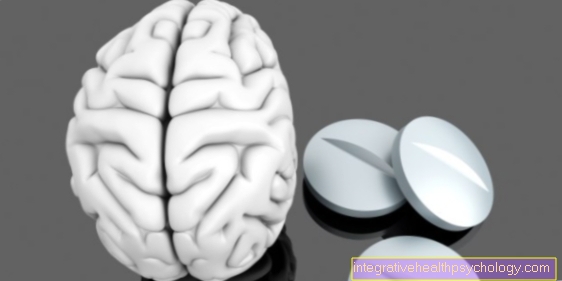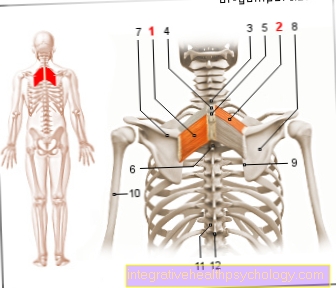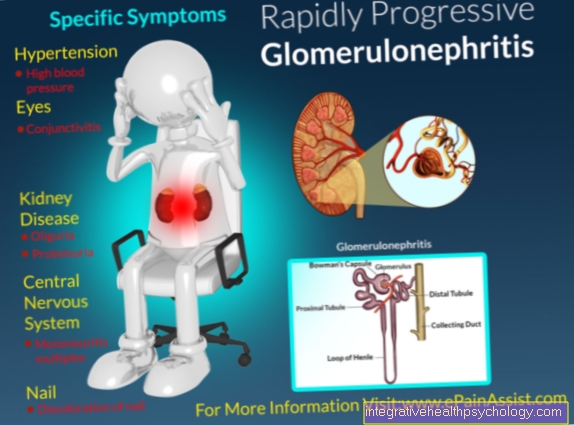Neuroleptics
definition
For neuroleptics (synonym: Antipsychotics) is a group of drugs that are used for a number of different mental illnesses.
These include, for example, schizophrenia or delusional states. In addition to these diseases, some neuroleptics are also used in the presence of chronic pain and in the area of anesthesia. The group of neuroleptics includes drugs and active ingredients, some of which are very different from one another.

The effect of different neuroleptics is not always the same, but varies depending on the active ingredient and dosage.
Common neuroleptics work by blocking various receptors in the brain. Depending on which receptors are blocked, the indications for the prescription of the drug and the specific side effects of the neuroleptic result.
Medication
There are a number of different drugs and active ingredients that can be assigned to the group of neuroleptics. In order to better differentiate this group of drugs, neuroleptics are basically divided between so-called conventional such as atypical Differentiated neuroleptics. These groups differ largely in their mechanisms of action and side effects.
The conventional neuroleptics include drugs with the active ingredients:
- Haloperidol
- Benperidol
- Flupentixol
- Flus pirils
- Fluphenazine
- Perphenazine
- Chlorpromazine
- Melperon
- Levomepromazine
- Chlorprothixes
- Pipamperon
- Promethazine
Medicines that belong to the group of atypical neuroleptics contain active ingredients such as:
- Risperidone
- Olanzapine
- Clozapine
- Quetiapine
- Amisulpride
- Ziprasidone
- Aripripazole
The active ingredients also differ from one another within the respective group. For example, some active ingredients are used in classic psychiatric illnesses, while other drugs are used more as sedatives.
Effect of neuroleptics
Neuroleptic is a medical term, which as nerve calming agent can be translated. All drugs that come under the term of a neuroleptic have in common that they have a more or less strong calming effect. Blocking individual receptors in the brain can also have a positive effect on psychiatric illnesses. To achieve these effects, certain neurotransmitter receptors in the brain are blocked.
The blocked messenger substance is the so-called Dopamine. The active ingredient contained in the neuroleptic attaches itself to the dopamine receptor and blocks it, so that the transmitter can no longer bind to the receptor. This mechanism prevents the action that dopamine normally has on this receptor. Little is known about the exact background, why a blockade of these receptors leads to an improvement in psychiatric illnesses. Studies have shown, however, that neuroleptics can maintain their raison d'etre in the treatment of these diseases and that very good results can sometimes be achieved in the treatment of psychiatric diseases.
The effect of the individual drugs, which fall under the generic term of a neuroleptic, is by no means always the same. Basically, a distinction can be made between a conventional or classic neuroleptic and an atypical neuroleptic. In particular, the side effects that occur frequently with the individual drugs differ here.
The classic neuroleptics block a dopamine receptor in the brain, which is called D2 receptor referred to as. These receptors probably play a role in the development of diseases such as schizophrenia, Addictive behavior and eating disorder. Blocking these receptors can therefore lead to therapeutic success in the treatment of these diseases. The disadvantage of these drugs are the common side effects, known as extrapyrimidal disorders (EPS) are known. There may be involuntary muscle movements and tremors, as well as frequent falls.
Atypical neuroleptics have less of an effect on the D2 receptor, but instead block other receptors of the neurotransmitter dopamine. The effect on receptors D3 or D4 can also have an antipsychotic effect, with the occurrence of side effects affecting the muscles less frequently.
Side effects of neuroleptics
As with most medications, taking neuroleptics is associated with possible side effects. Depending on the active ingredient, different undesirable side effects can occur.
Typical of the classic neuroleptics are the so-called extrapyramidal disorders, which manifest themselves in involuntary muscle movements and muscle tremors as well as an increased tendency to fall. It can also lead to unwanted production of breast milk and its leakage on the nipples. A pronounced dry mouth and constipation are also not uncommon. By taking this medication it can also Heart rhythm disorders come. There are also frequent complaints about weight gain in the course of treatment.
The side effects of atypical neuroleptics differ greatly from one active ingredient to another. Especially developing one Diabetes mellitus, weight gain, pronounced dry mouth and constipation are typical side effects.
In general, all neuroleptics can also have a life-threatening side effect, which is called Neuroleptic Malignant Syndrome referred to as. These side effects are typically accompanied by a high fever, a very fast heartbeat, confusion, and loss of consciousness and should prompt you to stop taking the drug and see a doctor.
Weight gain
One of the most common side effects is one unwanted weight gain in the course of therapy with neuroleptics. It is important to note that not all drugs are known to cause weight gain. Both drugs that belong to the group of classic neuroleptics and drugs of atypical neuroleptics can be responsible for weight gain in the course of therapy. The reason for this is on the one hand a change in appetite caused by the drug and a change in metabolism in the body. This means that therapy with these drugs changes the utilization of individual food components and therefore weight gain can occur.
Known groups of active ingredients that can cause weight gain are, for example Clozapine, Olanzapine, Quetiapine such as Melperon, Levomepromazine, Chlorprothixes and Pipamperon. It should be noted, however, that weight gain does not always have to occur. In some cases, a loss of appetite was found, which even led to weight loss as part of the treatment.
Stopping neuroleptics
There can be different reasons why a neuroleptic should be discontinued. The brain adapts to the changes caused by taking neuroleptics, which is why a abrupt discontinuation of a neuroleptic drug is not recommended and can be associated with severe side effects. It is very difficult to predict which side effects may occur in an individual case. Psychological symptoms such as hallucinations or mood swings can occur. Psychotic symptoms often appear shortly after stopping the drug and usually improve within a few weeks.
From Trouble sleeping is reported frequently. Not infrequently, so-called dyskinesias can also occur. This leads to disturbed movements. So it can be that movements of the arms or hands are uncontrolled and involuntary muscle twitches and movements occur. General side effects that can occur affect the general condition and can manifest themselves in sweating, general malaise, dizziness, headache and palpitations. If taking certain neuroleptics led to weight gain, you may lose weight when you stop taking the medication.
Overall, there are always many and severe side effects to be expected if large amounts of the drug have been taken over a long period of time. In these cases in particular, it is therefore essential to slowly stop taking the neuroleptic in order to prevent severe side effects in the course of the disease.
In general, neuroleptics should only be discontinued if the person concerned is mentally stable and in a stable living environment. A doctor can help plan how to stop taking the drug. In general, a doctor should always be consulted before stopping a neuroleptic.
Neuroleptics for dementia

Neuroleptics are prescribed for a variety of different clinical pictures. In addition to the classic psychiatric illnesses such as schizophrenia Neuroleptics also come in agitation, confusion or severe restlessness and Anxiety for use. So many older people get some dementia also suffer from prescribed neuroleptics. In particular, the frequently occurring states of agitation and other behavioral problems in dementia patients should be treated by administering neuroleptics. Nowadays, however, we know that the administration of neuroleptics with simultaneous dementia leads to a significantly higher death rate.
Studies have also shown that the dementia itself worsens when neuroleptics are administered. Due to a different metabolism in older people, the side effects that can occur as part of therapy with neuroleptics are significantly more frequent than in younger patients. For these reasons, before administering neuroleptics to elderly people with dementia, it should always be weighed up whether the benefits of the treatment outweigh the risks and side effects associated with the therapy.
Quetiapine
At Quetiapine it is an active ingredient that is one of the atypical neuroleptics. A well-known drug with the active ingredient is called Seroquel® known and there are also some generics. Medicines with the active ingredient quetiapine are used for psychiatric disorders such as schizophrenia, manic and depressed Episodes as well bipolar disorder. The substance blocks both Serotonin as well as dopamine receptors in the brain. The blockage of these receptors leads to an increased release of dopamine and to a blockade of a certain receptor for dopamine. Through this mechanism, diseases such as schizophrenia as well as depression and anxiety can be treated successfully.
Extrapyrimidal disorders, i.e. disorders in the movement of individual muscles, occur only very rarely when taking quetiapine. On the other hand, side effects such as weight gain, particularly at the beginning of therapy, pronounced fatigue, constipation and an increased heart rate are noticed.
also read Drugs for depression





























